Curriculum
A child’s first six years lays the foundation for the rest of his life and is a period of enormous creation. At this stage, the child strives for functional independence, and as Dr. Maria Montessori said, it is a period where a child says,
“Help me to do it by myself.”
At this age, the child makes an initial adaptation to the world.
The Montessori curriculum for the first plane of development ( 0-3 years, 3-6 years) sets the foundation for lifelong learning, emphasizing the importance of self-motivation and self-discovery. By focusing on individualized learning and creating an environment that encourages exploration and independence, Montessori education helps children develop the fundamental skills they need to succeed in life.
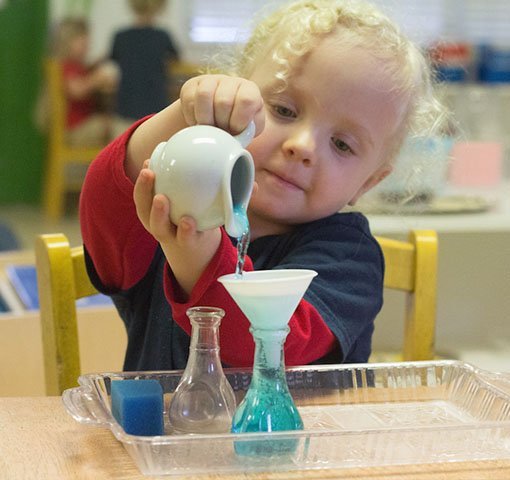
Practical Life
Practical life activities are an essential aspect of the Montessori curriculum for young children.
These activities involve real-life experiences and teach children how to perform basic tasks, such as dressing themselves, cleaning, and preparing food.
- Children use child-sized tools to participate in activities with visible, easily imitated movements, leading to greater physical skill, confidence, and concentration.
- Montessori education recognizes and bring up children’s natural desire to function independently in the adult world, encouraging them to say, “I can do it myself.”
- Preliminary activities such as Care of the Person, Care of the Environment, Grace and Courtesy, and Walking on the Line help children learn how to take care of themselves and their surroundings, interact with others politely, and control their movements.
- Practical life activities help children develop practical skills, improve their concentration, coordination, and independence.
- These activities provide children with a sense of purpose and accomplishment, building their self-esteem and confidence.
- Practical life skills and qualities learned in Montessori education serve as a strong foundation for success in later life.
- Montessori education emphasizes the importance of practical life skills and integrates them into the curriculum for young children.
- Practical life activities empower children to take charge of their learning and personal development, enabling them to lay the foundation for future success.
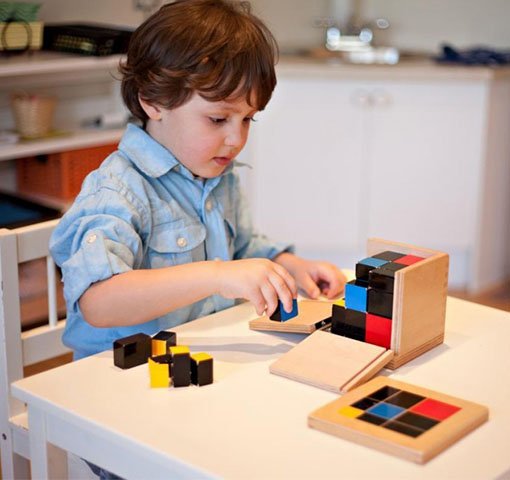
Sensorial
In Montessori, we understand that children experience the world through their senses, and it is through their sensory experiences that they construct their understanding of the world and develop their intellectual abilities
- Montessori sensorial materials offer children the opportunity to explore and comprehend various sensory stimuli they receive from the environment.
- Children engage with the sensorial materials to develop their ability to perceive and discern different attributes such as size, shape, texture, weight, sound, taste, and smell.
- These experiences lay the foundation for the development of other cognitive skills, including memory, reasoning, problem-solving, creative thinking, and self-expression.
- Montessori sensorial materials enable children to refine their senses and establish a solid foundation for their future learning and development.
The sensorial materials provide a rich and engaging learning experience that supports the child’s natural curiosity and desire to explore the world around them.
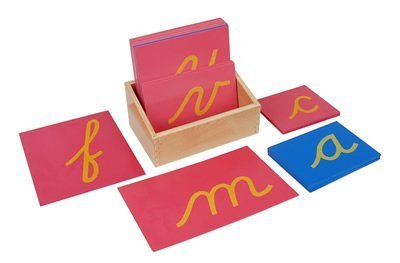
“The development of language is part of the development of the personality, for words are the natural means of expressing thoughts and establishing understanding between people.”
Language
We recognise spoken language as the fundamental building block of all linguistic development.
- Multi-sensory approach: Montessori education uses stories, songs, and games to expose children to the sounds and symbols of language, promoting speaking and listening skills.
- Moveable alphabet: Manipulating letters to create words helps children develop reading and writing skills and an understanding of language structure.
- Phonetic approach: Montessori focuses on the sounds of language for faster reading skill development.
- Reading materials: A rich variety of reading materials, including books, magazines, and newspapers, fosters a lifelong love of reading.
- Oral language development: Opportunities for conversations with peers and teachers develop listening, speaking, and social skills.
- Phonemic awareness: The ability to identify and manipulate individual sounds in words is essential for reading and writing skills.
- Love of literature: High-quality literature is readily available, and children are encouraged to explore books and stories independently.
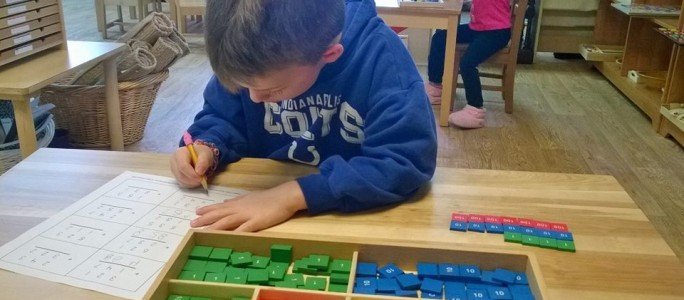
Mathematics
In Montessori, we believe that every child possesses an inherent mathematical ability. Montessori mathematics materials are designed to provide a concrete and tangible understanding of mathematical concepts.
These materials offer several benefits:
- Progression of learning: The Montessori materials progress from simple to complex, allowing children to build a solid foundation of mathematical understanding.
- Self-correcting: The materials are designed to be self-correcting, allowing children to learn through trial and error, and encouraging independence in their learning.
- Sensorial exploration: The materials enable children to explore mathematical concepts through their senses, enhancing their understanding of mathematical principles.
- Individualized learning: The materials allow children to work at their own pace and level, providing a personalized approach to learning.
- Joy of discovery: The materials encourage children to explore, experiment, and discover mathematical concepts, fostering a love of learning and a sense of accomplishment.
- Conceptual understanding: The materials provide children with a deep conceptual understanding of mathematical principles, enabling them to apply their knowledge in a variety of contexts.
- Empowerment: By providing a supportive and stimulating environment, Montessori mathematics materials empower children to take ownership of their own learning and develop their mathematical minds to reach their full potential.
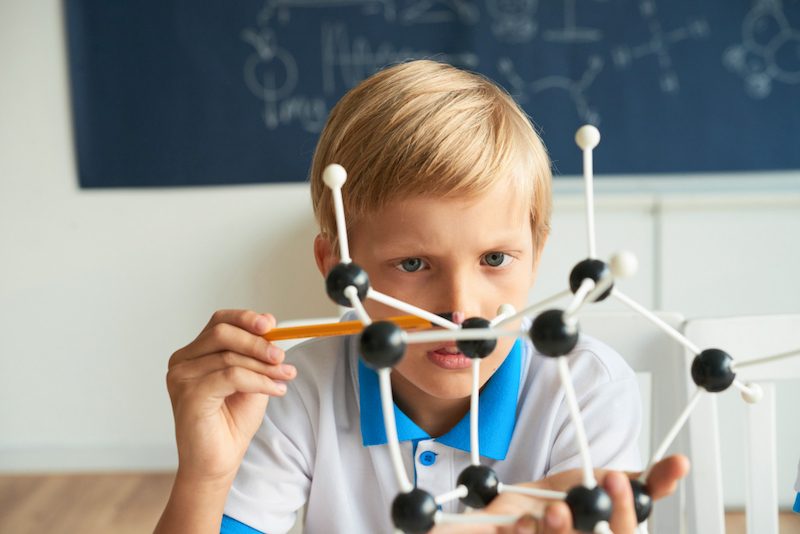
Biology
In Montessori education, we believe that language is a powerful tool for exploring the captivating field of biology.
- Zoology: Montessori education introduces children to the study of animals, including their structure, classification, and distribution.
- Botany: Montessori education also introduces children to the study of plants, including their classification, physiology, structure, and ecology.
- Hands-on activities: Montessori classrooms provide hands-on and interactive activities that allow children to explore and understand the living world around them.
- Appreciation for nature: Through the study of biology, Montessori education fosters a deep appreciation for nature, establishing a strong foundation for further exploration and discovery.
- Sensory experiences: Montessori education recognizes the importance of sensory experiences in early childhood development and incorporates them into the study of biology.
- Exploration and discovery: Montessori education encourages children to explore and discover the world around them, leading to a lifelong love of learning.
- Environmental awareness: Montessori education promotes environmental awareness and teaches children to value and respect the natural world.
- Structured approach: Montessori education provides a structured approach to studying biology, introducing children to the scientific principles that govern the living world.
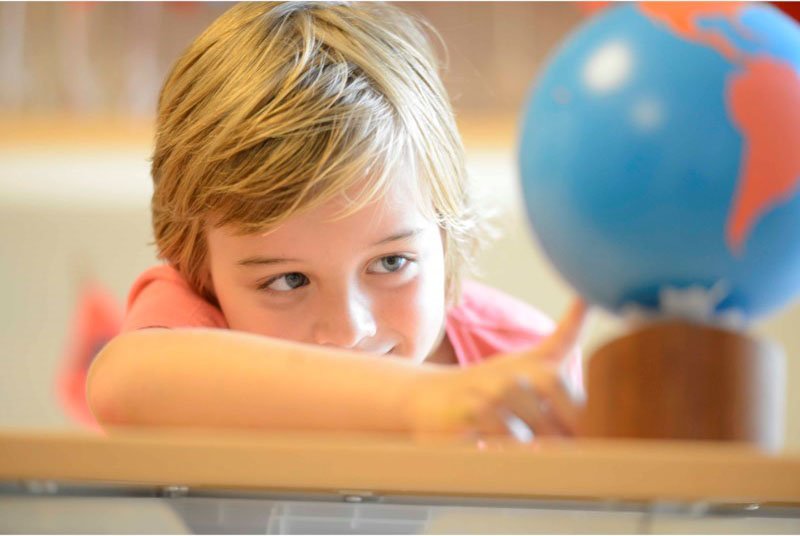
“He is an independent person who must be considered in terms of his own individual self.”
Geography
Montessori education recognises the importance of geography as a subject that fosters a deeper understanding of the world around us.
- Hands-on materials: Montessori geography materials are designed to be hands-on and interactive, allowing children to explore and learn about the physical features of the world in a concrete way.
- Cultural studies: Montessori geography materials provide children with the opportunity to learn about different cultures, languages, and traditions, promoting respect and understanding for diversity.
- Map skills: Montessori geography materials include maps and globes that help children develop map skills, such as reading coordinates and understanding different countries.
- Land and water forms: Montessori geography materials introduce children to the different physical features of the earth, including rivers, and oceans.
- Continents and countries: Children learn about the continents and countries of the world, including their cultures, languages, and landmarks.
- Sensorial exploration: Montessori geography materials enable children to explore the world through their senses, enhancing their understanding of geography and fostering a love of learning.
- Integration with other subjects: Montessori geography materials are integrated with other subjects, such as language and science, to provide a holistic approach to education.
- Global citizenship: By studying geography, children develop a sense of global citizenship, promoting respect, understanding, and cooperation with others around the world.

